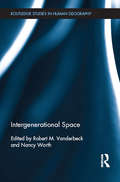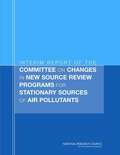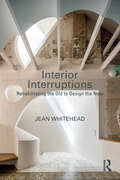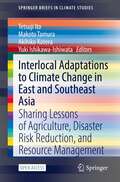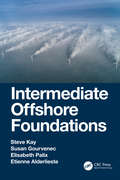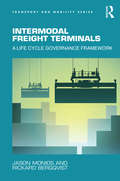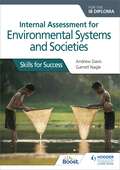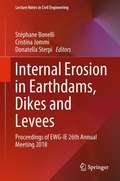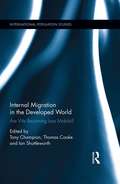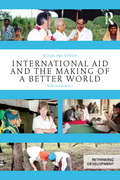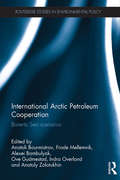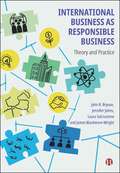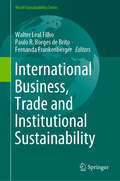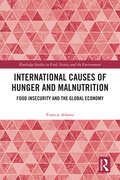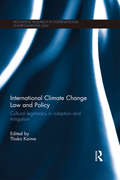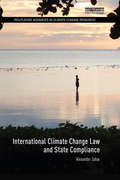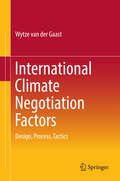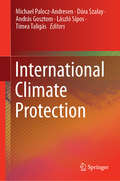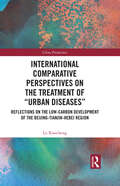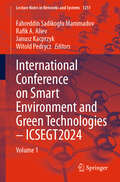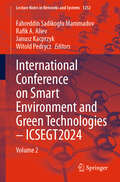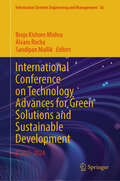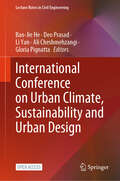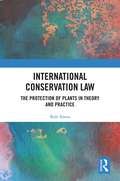- Table View
- List View
Intergenerational Space (Routledge Studies in Human Geography)
by Nancy Worth Robert VanderbeckIntergenerational Space offers insight into the transforming relationships between younger and older members of contemporary societies. The chapter selection brings together scholars from around the world in order to address pressing questions both about the nature of contemporary generational divisions as well as the complex ways in which members of different generations are (and can be) involved in each other’s lives. These questions include: how do particular kinds of spaces and spatial arrangements (e.g. cities, neighbourhoods, institutions, leisure sites) facilitate and limit intergenerational contact and encounters? What processes and spaces influence the intergenerational negotiation and contestation of values, beliefs, and social memory, producing patterns of both continuity and change? And if generational separation and segregation are in fact significant social problems across a range of contexts—as a significant body of research and commentary attests—how can this be ameliorated? The chapters in this collection make original contributions to these debates drawing on original research from Belgium, China, Finland, Poland, Senegal, Singapore, Tanzania, Uganda, the United States and the United Kingdom. .
Interim Report Of The Committee On Changes In New Source Review Programs For Stationary Sources Of Air Pollutants
by National Research Council of the National AcademiesThe U.S. Environmental Protection Agency’s New Source Review (NSR) programs are designed to help ensure that the construction or modification of factories, electric-generating facilities and other large stationary sources of pollutants will meet emissions criteria. EPA revised the programs in order to provide flexibility and allow for improved energy efficiency in American industry without damaging the environment. However, critics argue the revisions could slow progress in cleaning the nation’s air, potentially damaging human health. This interim report provides a synthesis of relevant background information and describes the approach the committee will use to assess the potential impact of the NSR revisions. Conclusions will be issued in a final report later this year.
Interior Interruptions: Rehabilitating the Old to Design the New
by Jean WhiteheadInterior Interruptions examines the role of the ‘palimpsest’ and its relationship to narrative, sustainability, renovation and adaptive reuse. By exploring storytelling, palimpsestic characteristics and techniques, the book argues that these devices play a central role in the consideration of the designed interior.Narrative has a burgeoning relationship with the palimpsest and this approach embraces an aesthetic of incompleteness and imperfection as a site rich response. It recognises the ongoing ‘biography’ or heritage of a building as a form of transient architectural narrative that encourages reuse through the continual process of writing, rewriting, overwriting and unwriting. This process has sustainable, societal, archaeological and textual connotations that can be interpreted as a process of ‘layering’ whereby the architectural shell is viewed as a container; a rich repository that is ‘overlain’ by surface changes, documents architectural and spatial modifications, and is populated by interior fixtures and fittings that all unite to create an ever-changing interior story.Exploring case studies from the UK, Netherlands, Palestine, Belgium, Singapore, Spain, Portugal, France, Germany, Brazil, Japan, USA and China and beautifully illustrated in full colour, this book proposes that the act of interior renovation can be viewed as a perpetual form of revisionary storytelling re-imagined as a series of temporal interior ‘interruptions’. It is essential reading for students and professionals interested in the built environment, including, but not limited to, interior design, interior decoration, interior architecture and architecture.
Interlocal Adaptations to Climate Change in East and Southeast Asia: Sharing Lessons of Agriculture, Disaster Risk Reduction, and Resource Management (SpringerBriefs in Climate Studies)
by Tetsuji Ito Makoto Tamura Akihiko Kotera Yuki Ishikawa-IshiwataThis Open Access book’s main focus is agriculture and natural resource management, disaster risk reduction, and human resource development in the countries of East and Southeast Asia and Japan.Asia is one of the regions which is the most vulnerable to the impacts of climate change. More than sixty percent of the world’s people live in the region, making it the growth center of the world. Asia is vast and includes various countries and regions, this book is focused on East and Southeast Asia including Japan. It is essential to share the knowledge and experiences for adapting climate change among these areas.In order to tackle these issues, the book aims to:Promote inter-local lessons learnt sharing climate change adaptations; "agriculture and natural resource management" and "disaster risk reduction and human resource development"Provides insights into new adaptation measures and research approaches that can consider the regional nature of Southeast AsiaShare practical adaptation options permeated by society in each country/regionThis book will be of interest to researchers and students examining climate change impacts in East and Southeast Asia.
Intermediate Offshore Foundations
by Susan Gourvenec Steve Kay Elisabeth Palix Etienne AlderliesteThe late Steve Kay was an independent geotechnical consultant with thirtythree years’ experience as a principal engineer with Fugro, and over fortyfive years as a geotechnical specialist, mainly in the oil and gas industry, both with contractors and consultants. His expertise was in shallow and intermediate (caisson, bucket, can) foundation design, with extensive worldwide experience in offshore, nearshore and land engineering. He gave suction foundation courses and master classes and wrote the commercially available software package CAISSON_VHM. Susan Gourvenec is Royal Academy of Engineering Chair in Emerging Technologies in Intelligent & Resilient Ocean Engineering, and Professor of Offshore Geotechnical Engineering at the University of Southampton, UK. Susan is currently Convenor of the International Standardisation Organisation (ISO) committee responsible for developing industry standards for marine soil investigation, marine geophysical investigation and offshore geotechnical design. Susan co-authored Offshore Geotechnical Engineering (CRC Press, 2011) and co-edited the proceedings of the inaugural and second International Symposia on Frontiers in Offshore Geotechnics (ISFOG). Elisabeth Palix has eighteen years’ experience in offshore geotechnics. She spent twelve years working for Fugro Geoconsulting before joining EDF Renouvelables, where she is working on design and installation aspects of offshore projects. Elisabeth is also a member of the TC 209 (ISSMGE) and has been involved in several geotechnical R&D projects (e.g. SOLCYP, SOLCYP+, PISA, Unified CPT-based methods). Etienne Alderlieste is a senior geotechnical researcher/consultant for Deltares, where he is working on installation and in-place capacity of intermediate and shallow offshore foundations. Before joining Deltares, Etienne worked as Senior Geotechnical Engineer at SPT Offshore, where he designed suction foundations for the oil, gas and offshore wind industry. He has also installed and reinstalled numerous single-suction anchors and several jacket structures with suction foundations worldwide.
Intermodal Freight Terminals: A Life Cycle Governance Framework (Transport and Mobility)
by Jason Monios Rickard BergqvistMuch work has been done on port governance yet little has addressed intermodal terminal governance, despite the clear similarities. This book fills that gap by establishing a governance framework for situating analysis of intermodal terminals throughout their life cycle. A version of the product life cycle theory is amended with governance theory to produce a framework covering each stage of the terminal’s life cycle, from the initial planning to the many decisions taken regarding the public/private split in funding mechanisms, ownership, selecting an operator, specifying KPIs to the operator, setting fees, earning profit, ensuring fair access to all rail service operators, and finally to reconcessioning the terminal to a new operator, managing the handover and maintaining the terminal throughout its life cycle. An institutional analysis of stakeholder relations, situated within a governance framework, illuminates these issues and enables not only conceptualisation and greater understanding of the geography of intermodal transport, but also decision-making and goal-setting by planners and policy makers. This book thus has three functions: first, as a textbook on the planning and operation of intermodal terminals; second, as a presentation of recent empirical research on intermodal terminal governance; third, as a framework for future research in which the broad field of analysis of intermodal transport can be viewed through a single lens and used to inform geographers, policymakers and planners.
Internal Assessment for Environmental Systems and Societies for the IB Diploma: Skills for Success
by Andrew Davis Garrett NagleSupport students through the Internal Assessment with advice and guidance including how to choose a topic, approach the investigation and analyse and evaluate results.- Build investigative and analytical skills through a range of strategies and detailed examiner advice and expert tips- Ensure understanding of all IB requirements with clear, concise explanations on the assessment objectives and rules on academic honesty, as well as explicit reference to the IB Learner Profile and ATLS throughout- Encourage students to achieve the best grade with advice and tips, including common mistakes to avoid, exemplars, worked answers and commentary, helping students to see the application of facts, principles and concepts- Reinforce comprehension of the skills with activity questions- Support visual learners with infographics at the start of every chapter
Internal Assessment for Environmental Systems and Societies for the IB Diploma: Skills for Success
by Andrew Davis Garrett NagleSupport students through the Internal Assessment with advice and guidance including how to choose a topic, approach the investigation and analyse and evaluate results.- Build investigative and analytical skills through a range of strategies and detailed examiner advice and expert tips- Ensure understanding of all IB requirements with clear, concise explanations on the assessment objectives and rules on academic honesty, as well as explicit reference to the IB Learner Profile and ATLS throughout- Encourage students to achieve the best grade with advice and tips, including common mistakes to avoid, exemplars, worked answers and commentary, helping students to see the application of facts, principles and concepts- Reinforce comprehension of the skills with activity questions- Support visual learners with infographics at the start of every chapter
Internal Erosion in Earthdams, Dikes and Levees: Proceedings Of Ewg-ie 26th Annual Meeting 2018 (Lecture Notes in Civil Engineering #17)
by Stéphane Bonelli Cristina Jommi Donatella SterpiThis book gathers the peer-reviewed contributions presented at the 26th Annual Meeting of the European Working Group on Internal Erosion in Embankment Dams, Levees and Dikes, and their Foundations (EWG-IE), held in Milano, Italy, on 10-13 September 2018. The meeting served as a fertile platform for discussion, sharing sound knowledge and introducing novel ideas on issues related to soil internal erosion in water retaining structures. The contributions encompass various aspects of laboratory techniques and findings, modelling and design criteria as well as prevention measures and field assessment. The book is a valuable, up-to-date tool that provides an essential overview of the subject for scientists and practitioners alike, and inspires further investigations and research.
Internal Migration in the Developed World: Are we becoming less mobile? (International Population Studies)
by Tony Champion Thomas Cooke Ian ShuttleworthThe frequency with which people move home has important implications for national economic performance and the well-being of individuals and families. Much contemporary social and migration theory posits that the world is becoming more mobile, leading to the recent ‘mobilities turn’ within the social sciences. Yet, there is mounting evidence to suggest that this may not be true of all types of mobility, nor apply equally to all geographical contexts. For example, it is now clear that internal migration rates have been falling in the USA since at least the 1980s. To what extent might this trend be true of other developed countries? Drawing on detailed empirical literature, Internal Migration in the Developed World examines the long-term trends in internal migration in a variety of more advanced countries to explore the factors that underpin these changes. Using case studies of the USA, UK, Australia, Japan, Sweden, Germany and Italy, this pioneering book presents a critical assessment of the extent to which global structural forces, as opposed to national context, influence internal migration in the Global North. Internal Migration in the Developed World fills the void in this neglected aspect of migration studies and will appeal to a wide disciplinary audience of researchers and students working in Geography, Migration Studies, Population Studies and Development Studies.
International Aid and the Making of a Better World: Reflexive Practice (Rethinking Development)
by Rosalind EybenHow can international aid professionals manage to deal with the daily dilemmas of working for the wellbeing of people in countries other than their own? A scholar-activist and lifelong development practitioner seeks to answer that question in a book that provides a vivid and accessible insight into the world of aid – its people, ideas and values against the backdrop of a broader historical analysis of the contested ideals and politics of aid operations from the 1960s to the present day. Moving between aid-recipient countries, head office and global policy spaces, Rosalind Eyben critically examines her own behaviour to explore what happens when trying to improve people’s lives in far-away countries and warns how self-deception may construct obstacles to the very change desired, considering the challenge to traditional aid practices posed by new donors like Brazil who speak of history and relationships. The book proposes that to help make this a better world, individuals and organisations working in international development must respond self-critically to the dilemmas of power and knowledge that shape aid’s messy relations. Written in an accessible way with vignettes, stories and dialogue, this critical history of aid provides practical tools and methodology for students in development studies, anthropology and international studies and for development practitioners to adopt the habit of reflexivity when helping to make a better world.
International Arctic Petroleum Cooperation: Barents Sea Scenarios (Routledge Studies in Environmental Policy)
by Indra Overland Anatoli Bourmistrov Frode Mellemvik Alexei Bambulyak Ove Gudmestad Anatoly ZolotukhinThe Arctic region contains large amounts of natural resources considered necessary to sustain global economic growth, so it is unsurprising that it is increasingly susceptible to political, economic, environmental, and even military conflicts. This book looks in detail at the preconditions and outlook for international cooperation on the development of Arctic petroleum resources, focusing on Norwegian–Russian cooperation in the Barents Sea towards 2025. The authors provide a cross-disciplinary approach including geopolitical, institutional, technological, corporate and environmental perspectives to analyse the underlying factors that shape the future development of the region. Three future scenarios are developed, exploring various levels of cooperation and development influenced by and resulting from potential political, commercial and environmental circumstances. Through these scenarios, the book improves understanding of the challenges and opportunities for Arctic petroleum resource development and promotes further consideration of the possible outcomes of future cooperation. The book should be of interest to students, scholars and policy-makers working in the areas of Arctic studies, oil and gas studies, energy security, global environmental governance, environmental politics and environmental technology.
International Business as Responsible Business: Theory and Practice
by Jennifer Johns John R. Bryson Laura Salciuviene James Blackmore-WrightFramed around central themes of risk, responsibility and sustainability, this textbook uses a practice-oriented approach to explore how global businesses are navigating disruptive innovations, responding to evolving regulations, adapting to climate change and developing strategies to enhance growth, sustainability and competitiveness. Key features include: • Case studies covering businesses of all sizes, from small firms to multinational corporations, across industries and countries; • Annotated further readings and guidance at the end of each chapter; • Access to a web-based instructor’s guide and supplementary teaching materials. Designed to spark debate and encourage discussion, this book equips students with the tools and perspectives needed to navigate the complexities of today’s international business landscape.
International Business, Trade and Institutional Sustainability (World Sustainability Series)
by Walter Leal Filho Fernanda Frankenberger Paulo R. Borges de BritoThis book addresses the gap between innovative technologies and their adoption. It showcases research, feasibility studies and projects that demonstrate a variety of ways to implement environmental sustainability in globally operating firms, as well as best practices in areas such as international management, adoption of cleaner technologies, global supply chains, greenhouse gas emission reduction, and transportation.The book provides state-of-the-art information on issues including:Global sustainable management practicesGlobal sustainable food and agricultural marketsGlobal responsible mining and energyGlobal sustainable sourcingGlobal sustainable transportationGlobal conservation innovations and investmentsPresenting expert contributions from industry, government and academia, discussing a variety of themes and perspectives on the topic "international business as a positive force of environmental sustainability” it is a vital resource for stakeholders in the international business community.
International Causes of Hunger and Malnutrition: Food Insecurity and the Global Economy (Routledge Studies in Food, Society and the Environment)
by Francis AdamsThis book examines the international causes of hunger and malnutrition and reveals how critical elements of the global economy heighten food insecurity in the developing world.At present, over two billion people in the developing world do not have secure access to safe, sufficient, and nutritious food. With the global population projected to rise to almost 10 billion by 2050, ensuring universal access to food will become increasingly urgent. The global community will need to redouble its efforts to effectively address the underlying causes of food insecurity. Within countries, a number of causes – poverty, poor governance, civil conflict, environmental decline - are immediately apparent and must be addressed to have any hope of lessening hunger and malnutrition. At the same time, a number of other factors well beyond national borders often constitute equal or greater obstacles to meeting the nutritional needs of all people. These factors are not nearly as visible and are largely outside the control of individual countries and local communities. This book examines how core elements of the global economy cause, prolong, and intensify food insecurity in the developing world. Emphasis is placed on agricultural trade, seed privatization, transnational land acquisitions, industrial fishing, and climate change. Understanding how these five factors impact the poorest communities in the poorest countries is essential for constructing an equitable, inclusive, and sustainable global food system that meets the nutritional needs of all people. By highlighting five major international causes of hunger and malnutrition, this book offers an alternate framework for understanding and combatting global food insecurity.This book will be of particular interest to students, scholars, and practitioners in the fields of global food security, international development, and global political economy.
International Climate Change Law and Policy: Cultural Legitimacy in Adaptation and Mitigation (Routledge Research in International Environmental Law)
by Thoko KaimeClimate change poses fundamental and varied challenges to all communities across the globe. The adaptation and mitigation strategies proposed by governments and non-governmental organisations are likely to require radical and fundamental shifts in socio-political structures, technological and economic systems, organisational forms, and modes of regulation. The sheer volume of law and policy emanating from the international level makes it uncertain which type of regulatory or policy framework is likely to have a positive impact. The success or failure of proposed measures will depend on their acceptability within the local constituencies within which they are sought to be applied. Therefore there is an urgent need to better comprehend and theorise the role of cultural legitimacy in the choice and effectiveness of international legal and policy interventions aimed at tackling the impact of climate change. The book brings together experts to present perspectives from different disciplines on the issue of international climate change law and policy. Beginning from the premise that legitimacy critiques of international climate change regulation have the capacity to positively influence policy trends and legal choices, the book showcases innovative ideas from across the disciplines and investigate the link between the efficacy of international legal and policy mechanisms on climate change and cultural legitimacy. The book includes chapters on with a theoretical basis as well as specific case-studies from around the globe. The topics covered include: land use planning as a tool of enhancing cultural legitimacy, indigenous peoples in international environmental negotiations, transnational advocacy networks, community-based forestry management and culture and voluntary social movements.
International Climate Change Law and State Compliance (Routledge Advances in Climate Change Research)
by Alexander ZaharA solution to the problem of climate change requires close international cooperation and difficult reforms involving all states. Law has a clear role to play in that solution. What is not so clear is the role that law has played to date as a constraining factor on state conduct. International Climate Change Law and State Compliance is an unprecedented treatment of the nature of climate change law and the compliance of states with that law. The book argues that the international climate change regime, in the twenty or so years it has been in existence, has developed certain normative rules of law, binding on states. State conduct under these rules is characterized by generally high compliance in areas where equity is not a major concern. There is, by contrast, low compliance in matters requiring a burden-sharing agreement among states to reduce global greenhouse gas emissions to a ‘safe’ level. The book argues that the substantive climate law presently in place must be further developed, through normative rules that bind states individually to top-down mitigation commitments. While a solution to the problem of climate change must take this form, the law’s development in this direction is likely to be hesitant and slow.The book is aimed at scholars and graduate students in environmental law, international law, and international relations.
International Climate Negotiation Factors
by Wytze GaastProviding a detailed examination of climate negotiations records since the 1990s, this book shows that, in addition to agreeing on climate policy frameworks, the negotiations process is of crucial importance to success. Shedding light on the dynamics of international climate policymaking, its respective chapters explore key milestones such as the Kyoto Protocol, Marrakech Accords, Cancun Agreement and Doha Framework. The book identifies a minimum of three conditions that need to be fulfilled for successful climate negotiations: the negotiations need to reflect the fact that climate change calls for global solutions; the negotiation process must be flexible, including multiple trajectories and several small steps; and decisive tactical maneuvers need to be made, as much can depend on, for example, personalities and the negotiating atmosphere. With regard to the design of an international climate policy regime, the main challenge presented has been the inability to agree on globally supported greenhouse gas emission reduction measures. The book offers an excellent source of information for researchers, policymakers and advisors alike.
International Climate Protection
by Michael Palocz-Andresen Dóra Szalay András Gosztom László Sípos Tímea TaligásThis book explains the current climate protection processes and technologies, and informs the readers of the limiting factors and opportunities for future development. It represents the highest level of knowledge from leading scientists all over the world. Original high quality figures maximize understanding of the text. The book also introduces a new concept (climatographic), which provides a well pronounced solution to climate protection that is easily understandable for all levels of readers.
International Comparative Perspectives on the Treatment of “Urban Diseases”: Reflections on the Low-Carbon Development of the Beijing-Tianjin-Hebei Region (China Perspectives)
by Lu XiaochengWith an integration of theories, comparative and empirical studies, this book aims to find a treatment for Beijing’s “urban diseases” and coordinate a low-carbon development plan for the Beijing-Tianjin-Hebei region in China. Unprecedented industrialization and unconventional urbanization caused a series of “urban diseases” for developing cities across the globe. By summarizing and exploring the evolution and phased characteristics of “urban diseases”, the author implements theories across classical sociology, human ecology, community school, and low-carbon city as the base for policy recommendations. This book also provides in-depth examinations and comparative studies of other metropolises’ experiences in controlling “urban diseases”. Cities such as New York, London, and Tokyo were modeled to propose the most appropriate low-carbon development plan for the Beijing-Tianjin-Hebei region. With a focus on developing cities in Northern China, this book will be a great read to all scholars and students of environmental studies, development studies, urban studies, and contemporary China studies. It will also be a great addition for those who are interested in social conflicts and economic development.
International Conference on Smart Environment and Green Technologies – ICSEGT2024: Volume 1 (Lecture Notes in Networks and Systems #1251)
by Witold Pedrycz Janusz Kacprzyk Rafik A. Aliev Fahreddin Sadikoglu MammadovThis book compiles state-of-the-art studies and real-world applications in ecosystems and smart environments. It covers important subjects like creating a sustainable economy, green and renewable energy, and IoT-powered industrial and agricultural systems. Along with providing insights into theory, modelling, and the deployment of smart cities and infrastructure, the book also examines the use of AI in the earth and environmental sciences and economy. The book is intended to be a priceless tool for scholars, professionals, and recent graduates. It acts as a manual and source of inspiration for promoting environmentally friendly technologies and sustainable solutions. It opens the door for creating intelligent systems that maximise resource use, reduce carbon footprints, and enhance general quality of life by incorporating the most recent technological developments.
International Conference on Smart Environment and Green Technologies – ICSEGT2024: Volume 2 (Lecture Notes in Networks and Systems #1252)
by Witold Pedrycz Janusz Kacprzyk Rafik A. Aliev Fahreddin Sadikoglu MammadovThis book compiles state-of-the-art studies and real-world applications in ecosystems and smart environments. It covers important subjects like creating a sustainable economy, green and renewable energy, and IoT-powered industrial and agricultural systems. Along with providing insights into theory, modelling, and the deployment of smart cities and infrastructure, the book also examines the use of AI in the earth and environmental sciences and economy. The book is intended to be a priceless tool for scholars, professionals, and recent graduates. It acts as a manual and source of inspiration for promoting environmentally friendly technologies and sustainable solutions. It opens the door for creating intelligent systems that maximise resource use, reduce carbon footprints, and enhance general quality of life by incorporating the most recent technological developments.
International Conference on Technology Advances for Green Solutions and Sustainable Development: ICT4GS-2024 (Information Systems Engineering and Management #56)
by Álvaro Rocha Brojo Kishore Mishra Sandipan MallikThis book presents the proceedings of the International Conference on Technology Advances for Green Solutions and Sustainable Development (ICT4GS-2024) held from August 9–10, 2024, and organized by the Department of Computer Science and Engineering, NIST University, Berhampur - 761008, Odisha, India. The event provided a platform for researchers, professionals, and policymakers to exchange ideas and discuss recent innovations in green technologies and sustainable practices. The conference featured keynote speeches, paper presentations, and thematic discussions on topics such as renewable energy, IoT for environmental monitoring, and sustainable agriculture. ICT4GS-2024 was conducted in hybrid mode (both online and onsite), enabling global participation.
International Conference on Urban Climate, Sustainability and Urban Design (Lecture Notes in Civil Engineering #559)
by Li Yan Ali Cheshmehzangi Deo Prasad Bao-Jie He Gloria PignattaThis open access book is a proceeding of the International Conference on Urban Climate, Sustainability, and Urban Design in Mianyang (MYUCSUD). This work focuses on the latest thoughts, ideas, models, methods, solutions, and practices on urban climate mitigation and adaptation through sustainable planning and design, covering interdisciplinary topics in architecture, urban-rural planning, meteorology, building and construction engineering, material engineering, geographic sciences, public health, public administration, computer sciences, etc. This book can provide students and researchers from urban planning, urban design, urban meteorology, civil and construction engineering and urban governance with better understanding of urban climate sciences, innovative ideas, and tangible solutions.
International Conservation Law: The Protection of Plants in Theory and Practice
by Rob AmosThrough a combination of theoretical and empirical approaches, this book explores the role of international environmental law in protecting and conserving plants. Underpinning every ecosystem on the planet, plants provide the most basic requirements: food, shelter and clear air. Yet the world’s plants are in trouble; a fifth of all plant species are at risk of extinction, with thousands more in perpetual decline. In a unique study of international environmental law, this book provides a comprehensive overview of the challenges and restrictions associated with protecting and conserving plants. Through analysing the relationship between conservation law and conservation practice, the book debates whether the two work symbiotically, or if the law poses more of a hindrance than a help. Further discussion of the law’s response to some of the major threats facing plants, notably climate change, international trade and invasive species, grounds the book in conservation literature. Using case studies on key plant biomes to highlight the strengths and weaknesses of the law in practice, the book also includes previously unpublished results of an original empirical study into the correlations between the IUCN Red List and lists of endangered/protected species in international instruments. To conclude, the book looks to the future, considering broader reforms to the law to support the work of conservation practitioners and reshape humanity’s relationships with nature. The book will be of interest to scholars and students working in the field of international environmental law and those interested more broadly in conservation and ecological governance frameworks.
